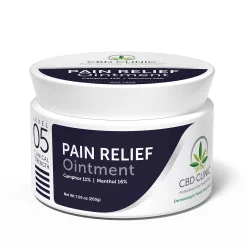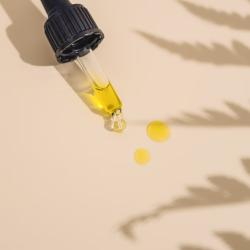CBD While Nursing: What You Need to Know

Image Source: Unsplash
Discover the potential benefits of using CBD while nursing and how it can support your well-being as a new mother. CBD, short for cannabidiol, is a naturally occurring compound found in the cannabis plant. While there is still much research to be done, many women are turning to CBD as a natural alternative for managing postpartum symptoms such as anxiety, insomnia, and pain.
When it comes to incorporating CBD into your routine as a nursing mother, it’s important to prioritize safety and consult with your healthcare provider. Their guidance can help ensure that you choose the right CBD product and dosage that aligns with your individual needs and circumstances.
In this article, we'll delve into the science behind CBD and how it interacts with the body, discuss the potential benefits and risks of using CBD while nursing, and provide tips on finding high-quality CBD products. Whether you're curious about how CBD can help alleviate your postpartum symptoms or looking for information on using CBD while breastfeeding, this article will serve as a comprehensive guide to help you make informed decisions about your health and well-being as a new mother.
What is CBD?
CBD, or cannabidiol, is one of the many compounds found in the cannabis plant. Unlike tetrahydrocannabinol (THC), CBD does not have psychoactive effects, meaning it won't get you high. CBD works by interacting with the body's endocannabinoid system (ECS), which plays a crucial role in maintaining homeostasis, or balance, within the body.
The ECS consists of cannabinoid receptors, endocannabinoids (produced naturally by the body), and enzymes responsible for breaking down these endocannabinoids. When CBD is consumed, it interacts with the receptors in the ECS, potentially influencing various physiological processes such as pain perception, mood regulation, and immune function.
Research on CBD is still in its early stages, but preliminary studies suggest that CBD may have various therapeutic effects, including anti-anxiety, analgesic (pain-relieving), and anti-inflammatory properties. This is why many individuals, including nursing mothers, are turning to CBD as a potential natural remedy for various ailments.
Safety Considerations for Nursing Mothers
As a nursing mother, it's crucial to prioritize the safety of both yourself and your baby when considering the use of CBD. While CBD is generally considered safe for most adults, there are some important factors to consider.
First, it's essential to consult with your healthcare provider before incorporating CBD into your routine. They can provide personalized advice based on your medical history and any specific concerns you may have. They can also help you navigate the complexities of choosing the right CBD product and dosage.
Second, it's important to note that CBD can potentially interact with certain medications. This is because CBD is metabolized by the same enzymes in the liver that metabolize many medications. Thus, CBD has the potential to affect the efficacy and safety of certain medications. It's crucial to disclose all medications you are taking to your healthcare provider to ensure that CBD won't interfere with their effectiveness.
Lastly, it's essential to choose high-quality CBD products from top reputable CBD manufacturers. The CBD industry is largely unregulated, which means that not all products are created equal. Look for CBD products that have been third-party tested for purity and potency. Avoid products that make unrealistic claims or contain potentially harmful additives.
Research on CBD and Breastfeeding
While there is a lack of robust research specifically focused on CBD use while breastfeeding, the available evidence suggests that caution should be exercised. The limited studies conducted on cannabinoids and breastfeeding have mainly focused on THC, the psychoactive compound in cannabis. THC can be transferred to the baby through breast milk and may have adverse effects on their development.
It's important to note that CBD and THC are different compounds with different effects. CBD has not been shown to have the same psychoactive properties as THC. However, since CBD products can contain trace amounts of THC, it's possible that THC could be present in breast milk after CBD use.
Given the limited research and the potential risks, it's generally recommended to err on the side of caution and avoid using CBD while breastfeeding. However, it's essential to consult with your healthcare provider, who can provide guidance based on your specific circumstances.
Potential Benefits of Using CBD while Nursing
While the research on CBD and breastfeeding is limited, some nursing mothers have reported potential benefits from using CBD. These anecdotal reports suggest that CBD may help alleviate postpartum symptoms such as anxiety, insomnia, and pain.
One of the potential benefits of CBD is its anti-anxiety properties. Many new mothers experience heightened anxiety levels, and CBD may help promote a sense of calm and relaxation. CBD interacts with receptors in the brain that regulate mood and stress responses, potentially reducing anxiety symptoms.
Insomnia is another common issue faced by new mothers. CBD may help improve sleep quality by regulating sleep-wake cycles and reducing anxiety. By promoting better sleep, CBD could potentially enhance overall well-being and contribute to a more restful postpartum period.
Postpartum pain, whether from childbirth or breastfeeding-related discomfort, can be challenging to manage. CBD's anti-inflammatory and analgesic properties may provide relief from pain and inflammation. However, it's crucial to remember that pain management is highly individual, and what works for one person may not work for another.
Risks and Side Effects of Using CBD while Nursing
While CBD is generally considered safe for most adults, there are potential risks and side effects to be aware of when using CBD while nursing.
First, as previously mentioned, CBD products may contain trace amounts of THC. THC can be transferred to breast milk and potentially affect the baby's development. While the amounts of THC in CBD products are typically low, it's essential to consider this risk.
Second, CBD can cause side effects in some individuals. These side effects may include drowsiness, dry mouth, changes in appetite, and diarrhea. It's important to start with a low dosage and monitor your body's response to CBD. If you experience any adverse effects, it's recommended to reduce the dosage or discontinue use.
Lastly, the long-term effects of CBD use, especially during breastfeeding, are still largely unknown. It's essential to weigh the potential benefits against the potential risks and make an informed decision with the guidance of your healthcare provider.
Alternative Options for Managing Symptoms while Breastfeeding
If you're hesitant about using CBD while nursing or your healthcare provider advises against it, there are alternative options for managing postpartum symptoms.
For anxiety, stress management techniques such as deep breathing exercises, meditation, and yoga can be helpful. Engaging in regular physical activity, connecting with a support network, and seeking therapy or counseling can also provide relief.
To improve sleep quality, establishing a consistent sleep routine, creating a calming sleep environment, and practicing good sleep hygiene can be effective. Avoiding caffeine and electronic devices close to bedtime and ensuring your bedroom is dark, quiet, and cool can also contribute to better sleep.
For pain management, non-pharmacological approaches such as applying heat or cold packs, practicing relaxation techniques, and engaging in gentle exercises may provide relief. Over-the-counter pain relievers such as acetaminophen may also be considered, but it's important to consult with your healthcare provider before taking any medication.
Consultation with a Healthcare Professional
Throughout this article, the importance of consulting with a healthcare professional has been emphasized repeatedly. This point cannot be overstated. Your healthcare provider is the best resource when it comes to making informed decisions about your health and well-being as a nursing mother.
Whether you're considering using CBD, exploring alternative options, or seeking advice on managing postpartum symptoms, your healthcare provider can provide personalized guidance based on your medical history, current medications, and individual needs. They can help you navigate the complexities of using CBD while nursing and ensure that you make choices that prioritize the safety of both you and your baby.
Legal Considerations for Using CBD while Nursing
The legal status of CBD varies from country to country and even within different regions or states. It's important to familiarize yourself with the laws and regulations governing CBD use in your specific location.
In some places, CBD may be legal for both medical and recreational use. In others, it may be restricted to medical use only or be entirely illegal. Understanding the legal landscape will help you make informed decisions and avoid any potential legal consequences.
Personal Experiences and Testimonies
While personal experiences and testimonies can provide valuable insights, it's important to approach them with caution. Every individual is different, and what works for one person may not work for another. Anecdotal evidence should not be considered as a substitute for scientific research and medical advice.
When considering personal experiences and testimonies, it's essential to critically evaluate the source and consider the potential biases or subjective perspectives. While it can be helpful to hear about others' experiences, it's crucial to rely on evidence-based research and consult with your healthcare provider when making decisions about your health and well-being.
Conclusion
In conclusion, while there is still much to learn about the potential benefits and risks of using CBD while nursing, it's crucial to prioritize safety and consult with your healthcare provider. CBD holds promise as a natural alternative for managing postpartum symptoms such as anxiety, insomnia, and pain. However, due to limited research and the potential transfer of THC to breast milk, caution is advised.
If you choose to use CBD while nursing, ensure that you choose high-quality products from reputable manufacturers, disclose all medications to your healthcare provider, and monitor your body's response for any potential side effects. Explore alternative options for managing symptoms if you're hesitant about using CBD or your healthcare provider advises against it.
Remember, your healthcare provider is the best resource for personalized advice and guidance. They can help you make informed decisions that prioritize your health, well-being, and the safety of your baby.
More to Read:
Previous Posts:



